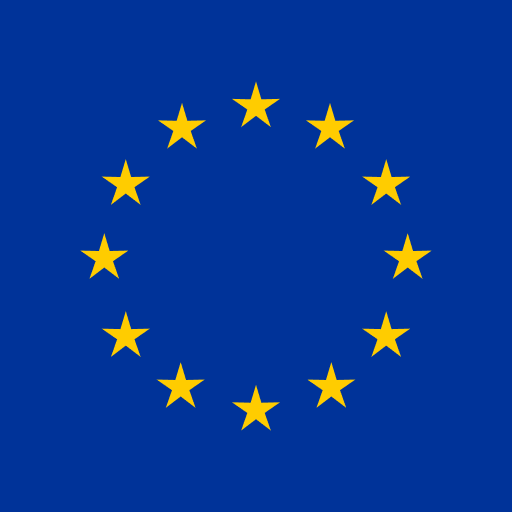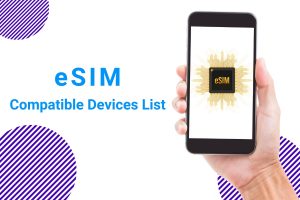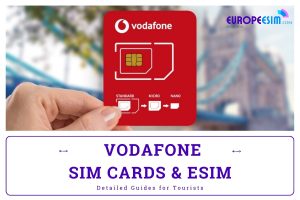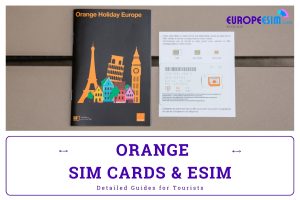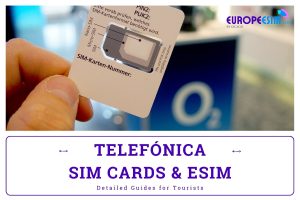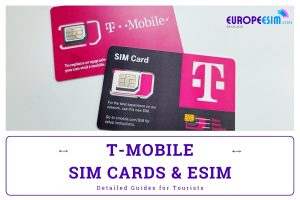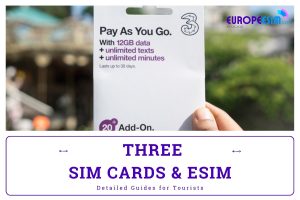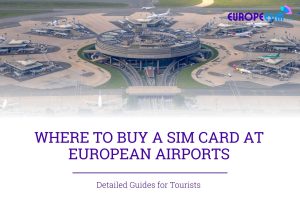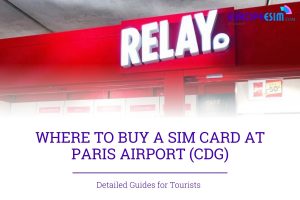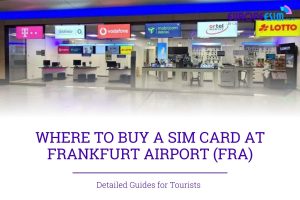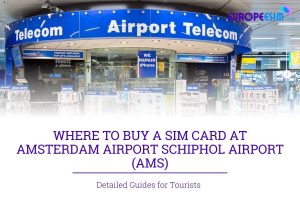A European SIM card offers a convenient and cost-effective way for tourists to stay connected across multiple countries without the hassle of high roaming charges. This comprehensive guide provides detailed information on selecting the best SIM card options, understanding data and call plans, and ensuring seamless setup for your trip throughout the European region.
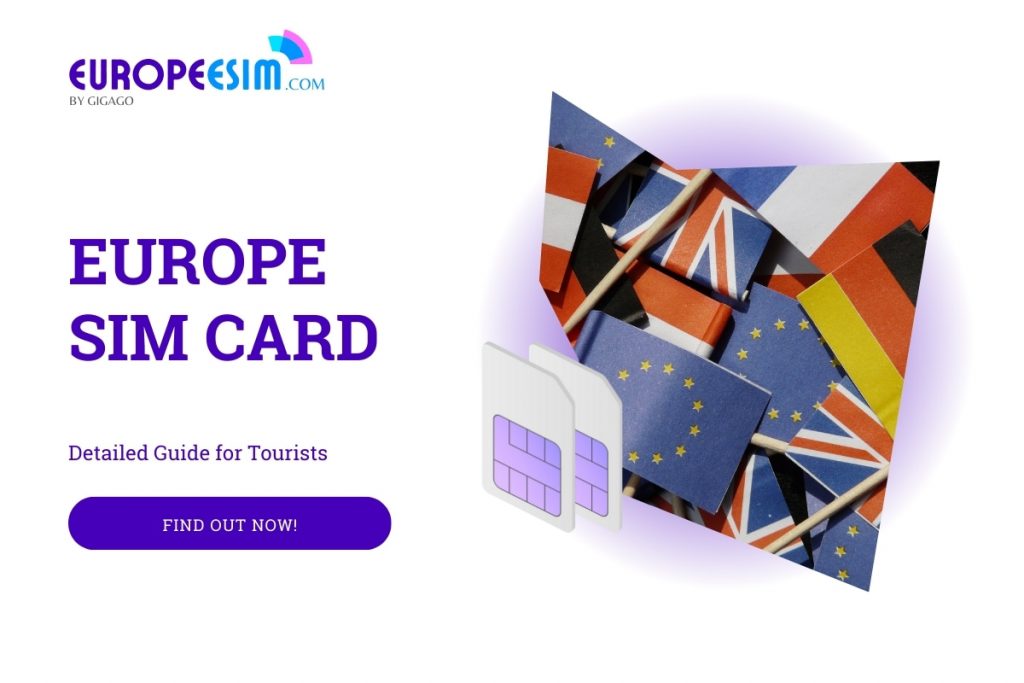
Table of Contents
I. European SIM card with free EU data roaming
Using a European SIM card allows you to use free data roaming within the European Union. With a SIM from any EU country, you can use your regular data allowance while traveling in other EU nations. This applies to both making calls and using mobile internet on your phone. There are no extra costs beyond what you’d usually pay at home.
II. Why choose a prepaid European SIM card for Europe over roaming?
A prepaid European SIM card often provides the easiest mobile internet options in Europe. You get one SIM that works across Europe with no extra charges. A prepaid European SIM card offers significant savings and benefits over roaming:
- Affordable rates for calls, texts, and data across Europe without roaming charges.
- No hassle of changing SIM cards in each country you visit.
- Often includes a minimum data allowance along with the ability to top up as needed during your trip.
- Useful for travelers who visit multiple countries in one trip and want consistent connectivity throughout Europe.
However, if staying in just one or two countries for an extended period, a local SIM from that country may work out cheaper. In some countries where data is especially cheap, like Spain or Portugal, purchasing a local SIM card may prove more economical once you arrive. A European SIM is best for multi-country trips where you need coverage across borders without changing SIMs.
III. Europe SIM card type – Which is the best for tourists?
For European tourists, pocket Wi-Fi provides offline freedom but can be costly and bulky. Roaming is convenient but expensive, and free Wi-Fi is often unreliable.
- Prepaid SIM cards and eSIMs offer the best balance of affordability and connectivity. Prepaid SIMs require ejecting your existing SIM, while eSIMs activate instantly, making them ideal for most travelers.
| Feature | Prepaid Europe SIM Card | Prepaid eSIM for Europe |
| Pros | Cost-effective: Avoid roaming charges with flexible data plans. | Super quick and easy: Buy and activate anywhere, no need to wait in line. |
| Wide coverage: Stay connected in multiple European countries with a single SIM. | Save money: Choose the right plan and avoid roaming fees. | |
| Easy setup: Purchase and activate either online or upon arrival. | One card, many countries: Stay connected across different countries. | |
| Flexibility: Share data with other devices and easily top up as needed. | Change your plan: Easily switch or top-up your plan via an app or website. | |
| Eco-friendly: Reduces plastic waste as there’s no physical SIM. | ||
| Cons | Limited availability: Not all retailers offer international SIMs, especially in smaller towns. | Compatibility issues: Not all phones, especially older models, support eSIM. |
| Potential compatibility issues: Ensure phone supports the SIM format (nano-SIM). | Limited features: Some eSIM plans may not support local phone numbers or voice calling. | |
| Higher upfront cost: International SIM cards may be more expensive than local ones. |
Overall, European SIM cards are a fantastic option for Europe-bound travelers seeking affordability, flexibility, and worry-free connectivity.
However, visitors can consider using eSIM as an alternative to embrace seamless European connectivity. Visit europe-esim.com today and unlock your adventure.
Important Note: To use eSIM, make sure your phone is:
- Unlocked: to receive signals from mobile network operators
- eSIM-compatible: Just new models of cell phones can support eSIM. See a full list of Europe eSIM-supported devices.
IV. Best Europe SIM card plans
The cost of a prepaid tourist SIM card or eSIM in Europe varies based on data, calls, and texts needed, as well as the provider. Prices typically range from US$10 to US$100 or more for sufficient coverage during your trip.
1. Orange Holiday Europe SIM/eSIM
Orange Holiday Europe SIM/eSIM is a popular choice for tourists visiting Europe. They offer a variety of data plans, from 1GB to 70GB of data, all with calls and texts within 30+ countries and regions in Europe. The price is between US$5 and US$50, depending on the data plan.
| Orange Holiday Europe | Price (USD) | Data | Validity | Calling & Texting |
| eSIM only | ~$5 | 1GB in 4G/LTE | 7 days | Not included |
| SIM & eSIM | ~$21 | 12GB in 4G/LTE | 14 days | 30 mins + 200 texts |
| ~$43 | 30GB in 4G/LTE | 14 days | 120 mins + 1000 texts | |
| ~$54 | 70GB in 5G | 28 days | 120 mins + 1000 texts |
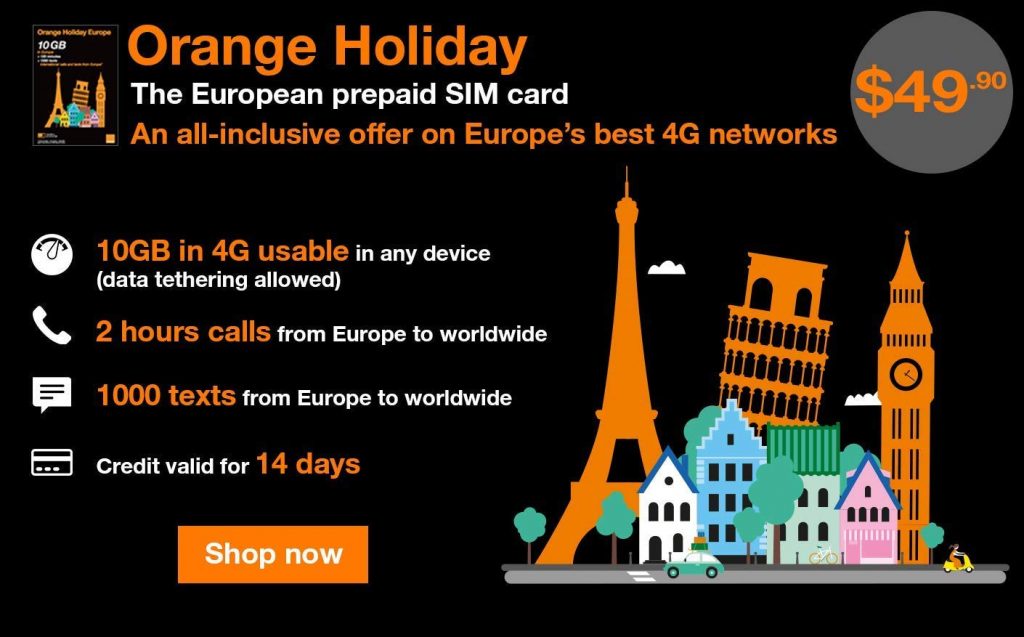
2. Bouygues My European SIM/eSIM

The Bouygues My European SIM/eSIM is a prepaid tourist package that offers 15-60GB of data, unlimited calls, and SMS within Europe, valid for 15 days or 30 days, with a price range from US$20 – US$40.
Bouygues My European SIM/eSIM
| Plan | Price (USD) | Data | Validity | Calling & Texting |
| Bouygues My European SIM/eSIM | ~$21 | 15GB | 15 days | - |
| ~$24 | 15GB | 15 days | Unlimited calls in France and in Europe | |
| ~$43 | 30GB | 30 days | Unlimited calls in France and in Europe |
Note: Customer service can only be reached by phone at 1034 and is available exclusively in French, with no options for WhatsApp or Facebook chat. This language barrier can make it challenging for tourists to resolve issues or seek assistance if they encounter any errors.
3. Three Pay As You Go Plan Data Pack
Three offers a range of Three Pay As You Go SIM cards for travelers to Europe. The price of a SIM card will vary depending on the amount of data, calls, and texts you need. However, you can expect to pay between US$10 and US$40 for a SIM card with a reasonable amount of data.
Three Pay As You Go Data Pack
| Plan | Price (USD) | Data | Validity | Calling & Texting |
| Three Pay As You Go Data Pack | ~$11 | 10GB | 1 month | Unlimited |
| ~$16 | 60GB | 1 month | Unlimited | |
| ~$21 | 120GB | 1 month | Unlimited | |
| ~$38 | Unlimited | 1 month | Unlimited |
4. T-Mobile Go5G International Plan
T-Mobile also offers T-Mobile international roaming plans. These plans typically include unlimited calling and texting, and a certain amount of data in Europe and other destinations. Data rates for T-Mobile’s international plans are as follows:
| Plan | Price (USD) | Data | Validity | Calling & Texting | Additional |
| T-Mobile Go5G Essential | 60 | 50GB in 5G/4G/LTE | 1 month | Unlimited | - |
| T-Mobile Go5G Plus | 90 | Unlimited | 1 month | Unlimited | In-flight connection Unlimited data in 215+ countries & destinations |
| T-Mobile Go5G Next | 100 | Unlimited | 1 month | Unlimited | In-flight connection Unlimited data in 215+ countries & destinationsUnlimited data in Canada & Mexico |
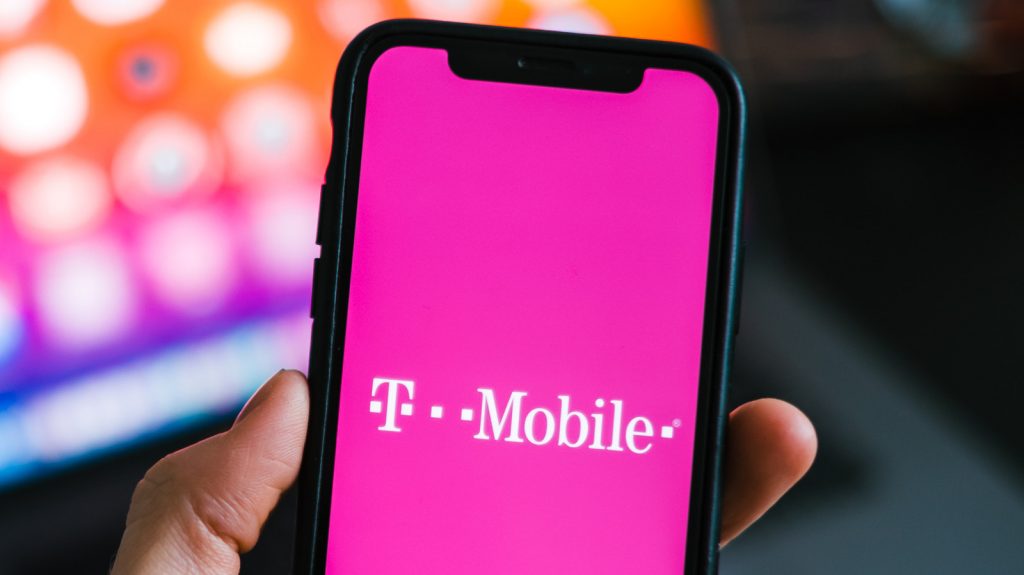
5. Vodafone Travel Europe eSIM
The Vodafone Travel Europe eSIM is a good option for travelers who need a simple and affordable way to stay connected while traveling in Europe. The Vodafone Travel Europe eSIM is a data-only eSIM that can be used in over 45 countries across Europe, and only for American and Canadian residents. The price of the eSIM starts at €12 (~US$13) for 5GB of data, and you can add more data as needed.
| Plan | Price (USD) | Data | Validity | Calling & Texting |
| Vodafone Travel Europe eSIM | ~$13 | 5GB | 10 days | - |
| ~$25 | 10GB | 15 days | - | |
| ~$38 | 20GB | 30 days | - |
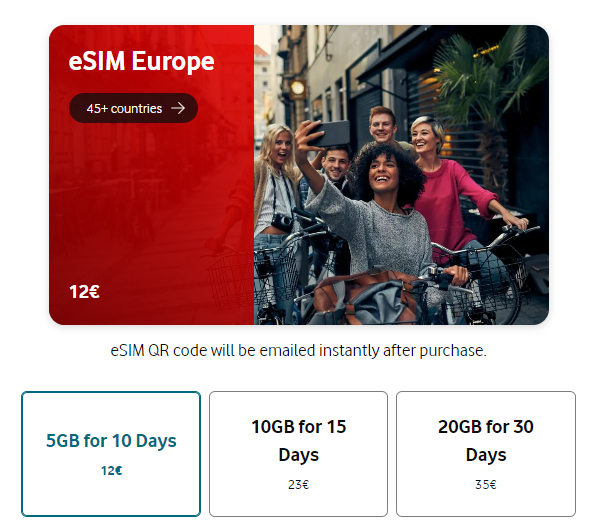
Bouygues and Orange would be good mid-tier options that balance cost and data allowance. T-Mobile is best if your budget allows for unlimited data usage. Three data packs are very cost-effective for light data use only. Consider your typical data needs and which countries you’re visiting the most.
V. Buying a prepaid SIM card in Europe – Where to buy?
There are many places to buy a prepaid SIM card in Europe. Here are 3 popular options:
1. Online
There are several popular online retailers for prepaid SIM cards in Europe such as SimOptions, Amazon, eBay, and TravelSIM.
- Price: Data package prices vary between €10-€30, plus costs for talk and text. It depends on the provider and plan. Cheaper than airport options, but shipping costs may apply.
- Pros: Convenient, wide selection, and compare prices in advance.
- Cons: Delivery time, possible activation issues upon arrival.
Bonus Tip: Check if your phone is eSIM compatible! This allows downloading virtual SIM cards directly, eliminating the need for a physical card.
2. Airport
If you need to get a SIM card as soon as you arrive in Europe, buying one from 7-Eleven, Relay, or major mobile carrier kiosks is the easiest option. However, keep in mind that airport SIM cards are usually more expensive than the ones you can buy online or in physical stores. Don’t forget to bring your passport or a valid photo ID, as most retailers require it for SIM card activation.
- Price: Expect higher prices compared to online and physical stores.
- Pros: Instant activation, no pre-planning needed.
- Cons: Expensive, limited selection, potentially crowded, and stressful.
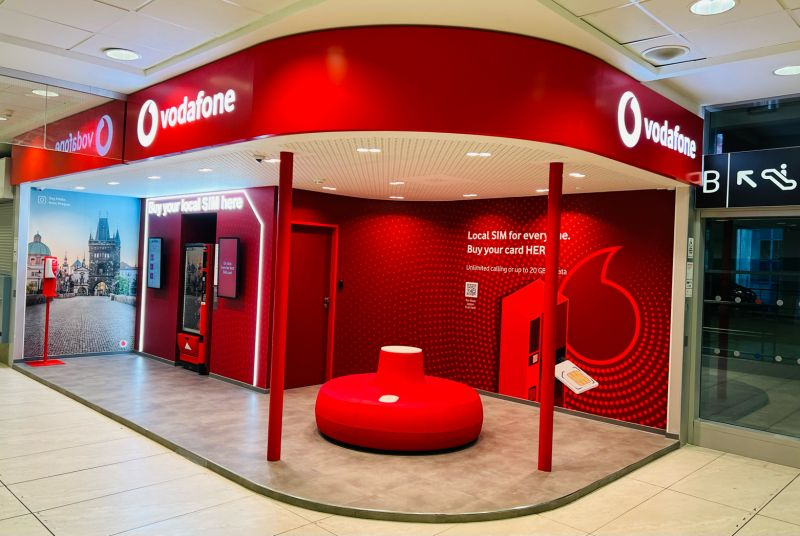
3. Physical Stores
If you want to compare prices and plans or get support in person, purchasing a SIM card can be a good option. However, it’s important to research available providers and plans in your destination country beforehand. You can find SIM cards at various stores, including carrier-specific stores, convenience stores, supermarkets, and gas stations.
- Price: Moderately priced, often cheaper than airport options.
- Pros: Good selection, compare prices, ask questions, get help with activation.
- Cons: Requires research and time, may not be available in all locations.
Recommendation: For maximum convenience and peace of mind, purchasing your SIM card online before your trip is the way to go. Not only will you avoid airport queues and inflated prices, but you’ll also have ample time to research and choose the perfect plan for your needs.

Important Note: While the EU has a free data roaming policy, travelers should ensure their European data plan includes it. Plans from Western countries like the UK, France, Netherlands, and Scandinavia generally provide free EU-wide roaming. However, some prepaid SIMs from Eastern Europe may limit free roaming between countries. So when getting a SIM card after arriving, always ask if it has unlimited roaming in the EU.
VI. Europe eSIM – Alternative to SIM card with data and calls for Europe
With Europe eSIM, you might not have to visit physical shops or switch to a physical SIM card, which saves you time and inconvenience. It typically includes data and calls, and you can use it in over 30 European countries. This means that you can stay connected with your friends and family back home without having to worry about expensive roaming charges.
Here are some of the benefits of using a Europe eSIM:
- Convenience. You can purchase and activate your Europe eSIM online or at an airport kiosk. You don’t need to wait in line to buy a physical SIM card.
- Environmentally friendly. eSIMs don’t require any plastic or paper, which makes them a more sustainable option.
- Wide coverage. Europe eSIMs often offer coverage in more countries than physical SIM cards.
- Easy to use. You can activate and manage your Europe eSIM through your phone’s settings.
- No roaming fees. With a Europe-eSIM, you can use your data and calls in all of the countries covered by the plan without paying roaming fees.
No more waiting around airport shops or worrying about coverage – with europe-esim.com nationwide 4G/5G networks, you’ll have reliable connectivity wherever you are.
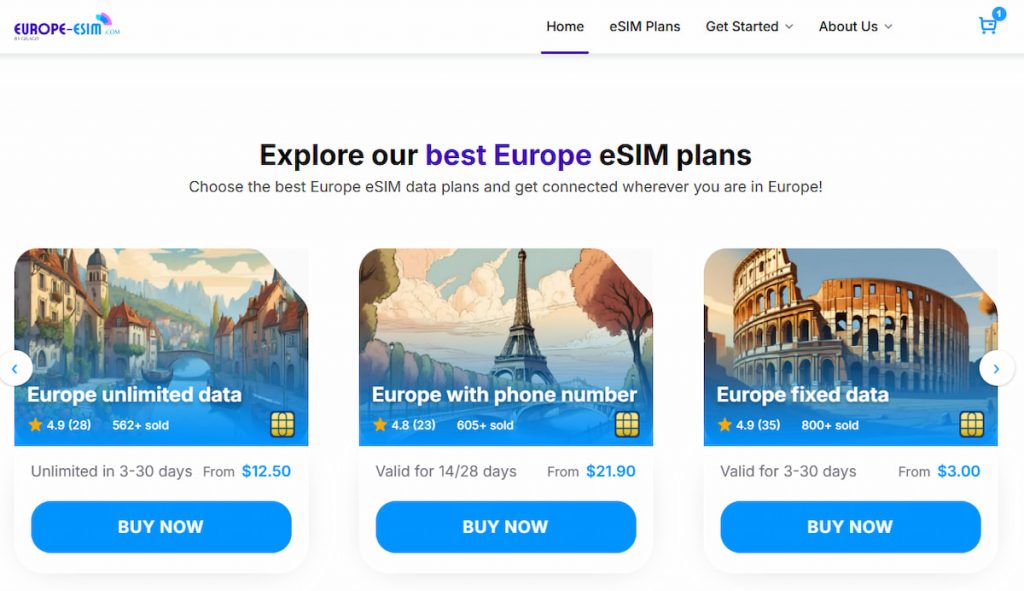
VII. Do European SIM plans come with a phone number?
Yes, mobile plans in Europe usually provide a local number. You’ll get a number from that location when activating service in an EU country. This means calls and texts within Europe are like domestic use, not pricier international rates. Keeping in touch with folks back home or locals is affordable.
Websites with eSIM plans for travel offer this phone number benefit, too. Whether a data-only package or one with calls/messages, a European number allows smooth mobile use across the EU.
Europe eSIM Data and Calls plan is perfect for travelers. Check out the Europe eSIM plan options below:
VIII. How to use a European SIM card
Using a European SIM card can be pretty straightforward. Here’s how to get started:
- Check your phone: Ensure it’s unlocked or European.
- Buy a SIM: At airports, carrier stores, or online (eSIM). Register SIM if required (passport/address).
- Insert & activate: Follow the instructions, and add credit/plan.
- Restart the phone: The Network should connect automatically.
- Enjoy! Make calls, text, and use data in Europe.
IX. How much mobile data do you need when traveling in Europe?
The amount of mobile data you need when traveling in Europe depends on several factors. Here is a concise recommendation for mobile data when traveling in Europe:
- Light users: If you’re a light data user who only plans to use your phone for basic tasks, 1 GB- 3 GB of data per week should be enough.
- Moderate users: If you’re a moderate data user who plans to use your phone for some streaming and GPS navigation, 3 GB- 6 GB of data per week should be enough.
- Heavy users: If you’re a heavy data user who plans to do a lot of streaming and video calling, 5GB or more of data per week will be necessary.
Purchase a local SIM card or arrange an international plan through your provider before traveling for affordable rates. Wi-Fi-only tablets save data.
XI. FAQs
Is there a SIM card that works in all of Europe?
Yes, there are SIM cards that work throughout the entire European Union. Certain UK and global SIMs provide calls, texts, and data in all EU/EEA countries without roaming fees.
Is there a SIM card for Europe with unlimited data?
It can be challenging to find truly unlimited data SIM cards, but some offer high data caps for use across multiple European countries. The Three PAYG Data Pack is an option for unlimited data.
Is eSIM available in Europe?
Yes, eSIM is available in Europe with various eSIM plans. Visitors can buy Europe eSIM via europe-esim.com.
Where can I buy a European SIM card?
Purchase online before your trip or at airports, mobile shops, and convenience stores upon arrival in Europe.
Is my phone compatible with European SIM cards?
Ensure your phone is unlocked and supports GSM networks, which are standard in Europe.
How much data do I need while traveling in Europe?
For basic use, 3-5GB per week may suffice; for streaming and frequent use, consider plans offering 10GB or more.
How do I activate a European SIM card?
Insert the SIM into your unlocked phone and follow the provider’s instructions. For eSIMs, scan the provided QR code to install the profile.
XIII. Final Words
Navigating Europe is more convenient with a SIM card or eSIM. This detailed guide to getting a European SIM card will walk you through everything you need to know, from choosing between physical SIM and eSIM options to finding the best plans for data, calls, and travel across multiple countries.
Designed with tourists in mind, this guide ensures you’re equipped with the right mobile solution for a seamless and stress-free European adventure.
